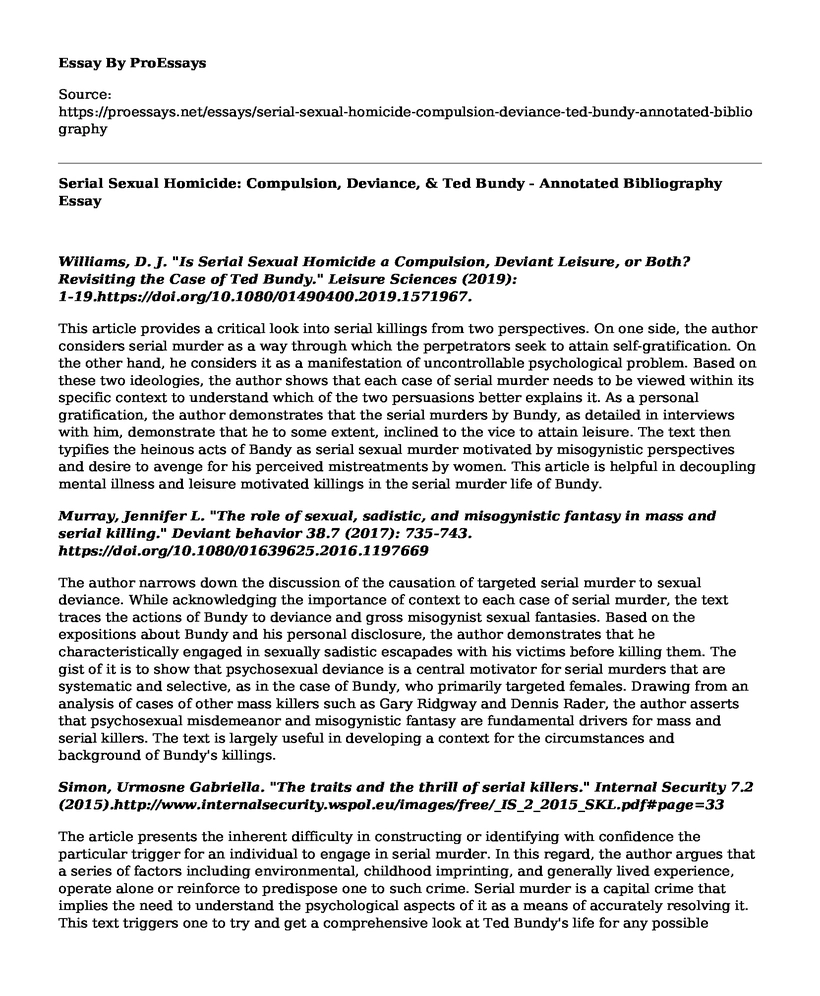Williams, D. J. "Is Serial Sexual Homicide a Compulsion, Deviant Leisure, or Both? Revisiting the Case of Ted Bundy." Leisure Sciences (2019): 1-19.https://doi.org/10.1080/01490400.2019.1571967.
This article provides a critical look into serial killings from two perspectives. On one side, the author considers serial murder as a way through which the perpetrators seek to attain self-gratification. On the other hand, he considers it as a manifestation of uncontrollable psychological problem. Based on these two ideologies, the author shows that each case of serial murder needs to be viewed within its specific context to understand which of the two persuasions better explains it. As a personal gratification, the author demonstrates that the serial murders by Bundy, as detailed in interviews with him, demonstrate that he to some extent, inclined to the vice to attain leisure. The text then typifies the heinous acts of Bandy as serial sexual murder motivated by misogynistic perspectives and desire to avenge for his perceived mistreatments by women. This article is helpful in decoupling mental illness and leisure motivated killings in the serial murder life of Bundy.
Murray, Jennifer L. "The role of sexual, sadistic, and misogynistic fantasy in mass and serial killing." Deviant behavior 38.7 (2017): 735-743. https://doi.org/10.1080/01639625.2016.1197669
The author narrows down the discussion of the causation of targeted serial murder to sexual deviance. While acknowledging the importance of context to each case of serial murder, the text traces the actions of Bundy to deviance and gross misogynist sexual fantasies. Based on the expositions about Bundy and his personal disclosure, the author demonstrates that he characteristically engaged in sexually sadistic escapades with his victims before killing them. The gist of it is to show that psychosexual deviance is a central motivator for serial murders that are systematic and selective, as in the case of Bundy, who primarily targeted females. Drawing from an analysis of cases of other mass killers such as Gary Ridgway and Dennis Rader, the author asserts that psychosexual misdemeanor and misogynistic fantasy are fundamental drivers for mass and serial killers. The text is largely useful in developing a context for the circumstances and background of Bundy's killings.
Simon, Urmosne Gabriella. "The traits and the thrill of serial killers." Internal Security 7.2 (2015).http://www.internalsecurity.wspol.eu/images/free/_IS_2_2015_SKL.pdf#page=33
The article presents the inherent difficulty in constructing or identifying with confidence the particular trigger for an individual to engage in serial murder. In this regard, the author argues that a series of factors including environmental, childhood imprinting, and generally lived experience, operate alone or reinforce to predispose one to such crime. Serial murder is a capital crime that implies the need to understand the psychological aspects of it as a means of accurately resolving it. This text triggers one to try and get a comprehensive look at Ted Bundy's life for any possible triggers. One glaring indication of aggression is his fascination with knives. From the article, it is possible to characterize the causes of Bundy's deviance within the contexts of environment, life, and childhood imprinting.
James, Veronyka. "Denying the Darkness: Exploring the Discourses of Neutralization of Bundy, Gacy, and Dahmer." Societies 9.2 (2019): 46. https://doi.org/10.3390/soc9020046.
James, in this article, applies neutralization as a concept to conceptualizes serial killers including Bundy, from victimization using neutralization. The author argues that the killers used neutralization to convince themselves that they were normal people. Through this perception, they maintain a positive self-presentation, which makes it difficult for any victim to suspect. The serial killers consciously develop ways of mitigating guilt and responsibility for their actions. In doing so, they do not get stigmatized from being called a serial murderer. No wonder Ted Bundy continued with his killings and expressed no remorse for it during interviews. This article is important in understanding personality camouflage and guilt attenuation by serial killers such as Bundy.
Sias, J. (2016). Serial Murder, Psychopathy, and Objectification. In The Meaning of Evil (pp. 23-51). Palgrave Macmillan, New York. https://link.springer.com/chapter/10.1057/978-1-137-56822-9_2.
The article contextualizes serial murder by notorious people like Ted Bundy and Edmund Kemper within the concept of psychopathy. The writing answers the question of whether really serial murderers are evil people as is often supposed or they are just victims of psychopathy. In this case, the author analyses psychopathy and how it plays out in the lives of serial killers. It evaluates philosophical theories on the evil, and if really, it befits the case of serial murderers. Based on the theories and concepts presented in the paper, it is derivable that the mere actin of murder may not necessarily imply being evil. This dimension is important in understanding the moral or social status of Bundy.
Works Cited
James, Veronyka. "Denying the Darkness: Exploring the Discourses of Neutralization of Bundy, Gacy, and Dahmer." Societies 9.2 (2019): 46. https://doi.org/10.3390/soc9020046.
Murray, Jennifer L. "The role of sexual, sadistic, and misogynistic fantasy in mass and serial killing." Deviant behavior 38.7 (2017): 735-743. https://doi.org/10.1080/01639625.2016.1197669
Simon, Urmosne Gabriella. "The traits and the thrill of serial killers." Internal Security 7.2 (2015).http://www.internalsecurity.wspol.eu/images/free/_IS_2_2015_SKL.pdf#page=33
Sias, J. (2016). Serial Murder, Psychopathy, and Objectification. In The Meaning of Evil (pp. 23-51). Palgrave Macmillan, New York. https://link.springer.com/chapter/10.1057/978-1-137-56822-9_2.
Williams, D. J. "Is Serial Sexual Homicide a Compulsion, Deviant Leisure, or Both? Revisiting the Case of Ted Bundy." Leisure Sciences (2019): 1-19.https://doi.org/10.1080/01490400.2019.1571967.
Cite this page
Serial Sexual Homicide: Compulsion, Deviance, & Ted Bundy - Annotated Bibliography. (2023, Mar 03). Retrieved from https://proessays.net/essays/serial-sexual-homicide-compulsion-deviance-ted-bundy-annotated-bibliography
If you are the original author of this essay and no longer wish to have it published on the ProEssays website, please click below to request its removal:
- Essay Sample on Racism and Ethics
- Deconstructing the Concept Of "Special Populations" Article Analysis Essay
- Paper Example on Increased Cost of Counter-Terrorism
- Essay Sample on Mary Shelley's Frankenstein: Revealing the Injustice of Women
- Workers' Protections in the USA - Essay Sample
- Paper Example on Victim-Blaming: Breaking the Silence on Sexual Harassment & Rape
- Symbolic Interactionism: Pragmatism's Dynamic Social Construct - Essay Sample







